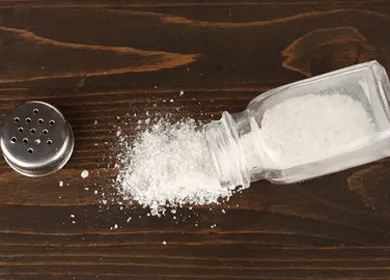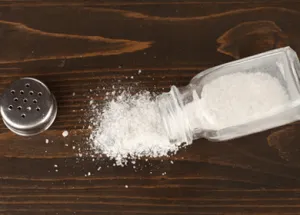
- Share on Facebook94
- Share on Pinterest
- Share on Twitter
Is salt bad for you? Well – yes and no. It actually depends on the type of salt you are referring to. There are many different varieties of salt and they vary in their texture, source and how they are processed. Like all food, the more processed, the worse it is for your health.
The American Heart Association recently reported that over 2.3 million deaths worldwide can be attributed to eating too much salt. Deaths from heart attacks, strokes and other heart-related conditions happen, in part, because of too much salt. But which salt is to blame?
 What is Table Salt?
What is Table Salt?
Salt is a natural mineral that is comprised of cube-shaped crystals of two elements sodium and chloride. Natural, unprocessed salt contains these two elements as well other naturally occurring minerals. On the other hand, processed salt, or table salt has nothing in common with the original crystal salt. Natural salt contains traces of iodine which gives it a bit of color. However, processing salt involves bleaching, which removes the trace nutrients. In addition, refined or table salt also contains up to 15% additives to prevent caking. It is the table salt that is found in processed and fast foods that is contributing to the salt-related deaths. Loaded with sodium, stripped of essential nutrients, bleached and full of toxic additives, table salt should be avoided at all costs.
What is Sea Salt?
Sea salt is collected from the oceans. Minimal processing leaves many of the natural trace minerals, which also reduces the amount of sodium. Sea salt contains magnesium, calcium, bromide and potassium which are necessary minerals that are stripped from the heat processing of refined salt. Be careful though, over 89% of sea salt producers are using refining methods which are taking out all of the essential nutrients of this salt. In addition, the oceans are being used as dumping grounds for toxic poisons such as mercury and PCB’s.
What is Himalayan Salt
Himalayan salt is pure and hand-mined from the Himalayan Mountains. This salt, known as “white gold,” contains 84 elements found in the human body. It is useful in regulating water throughout the body, promoting healthy pH balance in cells, supporting respiratory health promoting bone strength, supporting healthy sleep, promoting vascular health and regulating blood pressure. Himalayan salt contains no environmental pollutants and will not contribute to high blood pressure like table salt.
– The Alternative Daily
When shopping for sea salt, look for an unrefined sea salt. Unrefined sea salt retains all the natural minerals your body needs. The only sea salt we use in our kitchen is from Ava Jane’s Kitchen. Learn more and receive a special offer today!
- Share on Facebook94
- Share on Pinterest
- Share on Twitter

